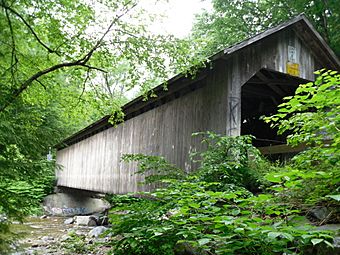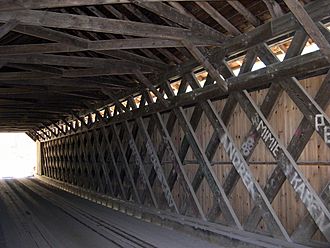Brown Covered Bridge facts for kids
The Brown Covered Bridge is a wooden covered bridge located in Shrewsbury, Vermont. This special bridge is found in the northwestern part of town. It helps Upper Cold River Road cross over the Cold River.
In 2011, the bridge was closed to cars because of damage from Tropical Storm Irene. But don't worry, it reopened on July 5, 2016, as a National Historic Site!
The bridge was built in 1880 by a famous bridge builder named Nichols M. Powers. In 2014, it was named a National Historic Landmark. This means it's a very important historical place. It's known as one of the best and most original examples of a Town lattice truss covered bridge in the whole United States.
|
Brown Covered Bridge
|
|

Bridge in 2010
|
|
| Nearest city | Rutland, Vermont |
|---|---|
| Built | 1880 |
| Architect | Powers, Nichols M. |
| Architectural style | Town Lattice |
| NRHP reference No. | 74000250 |
Quick facts for kids Significant dates |
|
| Added to NRHP | January 21, 1974 |
| Designated NHL | August 25, 2014 |
Contents
What Makes the Brown Covered Bridge Special?
The Brown Covered Bridge is in a quiet, wooded area in northwestern Shrewsbury. It's about 5 miles (8 km) southeast of Rutland, Vermont.
How the Bridge is Built
This bridge is 100 feet (30 m) long. It's built with a special design called a "lattice truss." This design was invented by an architect named Ithiel Town in 1820. The bridge rests on strong stone supports called "abutments." These supports have concrete caps on top. One of the abutments even has a huge boulder built right into it! This shows how the builders used the natural land.
The Brown Covered Bridge is thought to be the only covered bridge in the U.S. with a slate roof. This was a common style in the area a long time ago. The sides of the bridge are made of vertical wooden boards. There's a small opening near the roof. The road inside the bridge is about 13 feet 6 inches (4.1 m) wide.
Caring for the Bridge
The bridge has been well-cared for over the years. It mostly needed simple repairs. For example, in 2002, its sides were replaced, and its supports were fixed. In 2011, Tropical Storm Irene caused some minor flooding damage. The bridge was closed for a while but was later repaired and reopened.
A Look Back at the Bridge's History
The Brown Covered Bridge wasn't the first bridge in this spot. Maps from the mid-1800s show that people were crossing the river here even then. The bridge is named after George Brown, whose home was about 100 yards (91 m) away.
Who Built the Bridge?
The bridge was built in 1880. It cost less than $1100, which was a lot of money back then! The builder was Nichols M. Powers, a famous bridge builder from Vermont. He lived in nearby Clarendon. The Brown Covered Bridge was the last bridge he was known to have built before he passed away in 1897. Powers also built the famous Old Blenheim Bridge in New York, which was sadly destroyed by flooding from Tropical Storm Irene in 2011.
National Recognition
The Brown Covered Bridge was added to the National Register of Historic Places in 1974. This list includes important historical places across the country. It's one of about 110 "Town lattice truss" bridges still standing that were built before 1955.
In the 2000s, the National Park Service looked at covered bridges all over the country. The Brown Covered Bridge was chosen as one of the best and most important ones. Because of its special history and design, it was named a National Historic Landmark in 2014.
 | May Edward Chinn |
 | Rebecca Cole |
 | Alexa Canady |
 | Dorothy Lavinia Brown |


